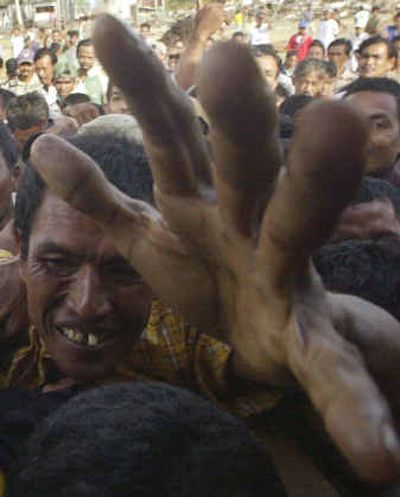Tsunami aid effort making progress

JAKARTA, Indonesia – Two weeks after the tsunami hit, the official death toll continues to rise, topping 150,000 Saturday as bodies were uncovered during the massive clean-up on the Indonesian island of Sumatra.
At the same time, however, the massive international aid effort seems to have found its legs. Major relief efforts often become “chaotic,” said Pat Johns, the emergency response coordinator for Catholic Relief Services, but “this time, it’s going well.”
And the World Health Organization said that no major disease outbreaks have been reported in the crowded refugee camps housing survivors.
Indonesia added another 2,737 people to the list of the confirmed dead Saturday, raising the number of victims in that country to 104,055 and pushing the global total over 150,000.
The hardest hit area stretches from Banda Aceh, a city at the northern tip of Sumatra, to the town of Meulaboh, about 125 miles down the coast, according to an initial assessment by a United Nations team. Farther south, the U.N. team found that “the damage is less severe, but people are still in need of assistance.”
The Indonesian government raised its estimate of the homeless to 655,132 on Saturday, but the actual number won’t be known until a full survey of the coast can be carried out.
The United Nations’ World Food Program is feeding about 130,000 refugees in Sumatra, with plans to start distributing a one-month supply of rice, beans and other food to another 140,000 over the weekend. If the government’s estimate of the homeless is accurate, it means the food is reaching less than half of the people displaced by the tsunami.
World governments led by Australia, Japan, Germany and the United States have pledged almost $4 billion in aid, and private donations to relief groups add to the total resources becoming available.
At Banda Aceh, sacks of rice and boxes of biscuits are stacked high. Trucks rumble in and out of the World Food Program warehouse with signs on the front: CARE, World Vision, Mercy Corps.
United Nations agencies are in place, the major private relief organizations are hard at work and the U.S. military is playing a major logistical role, shuttling supplies up and down the coast in helicopters.
Military detachments from across the globe – Portugal, Spain, Pakistan, Germany – are also here supporting the effort, as are an array of Indonesian aid organizations.
With communications knocked out and transportation systems leveled, it took several days for the relief effort to get up to speed.
“Emergencies are always complex,” said Eileen Burke of Save the Children.
“You always come across hiccups that slow your progress. You resolve them and move on.”
The United Nations is doing the coordinating, holding daily meetings with dozens of relief groups from around the globe.
The humanitarian assistance is easy to see now, with trucks unloading food and supplies all around Banda Aceh, the hub of the relief effort. Cargo planes come and go and helicopters thunder overhead all day, delivering supplies along the coast, where dozens of towns were wiped out.
Also Saturday, U.N. Secretary General Kofi Annan traveled to Sri Lanka to see the devastation there. Sri Lanka, with 30,000 killed, is the second-hardest hit country after Indonesia.
“We came to listen and to learn and I think you have given … (us) some ideas,” Annan told local officials.
More than 800,000 Sri Lankans were left homeless by the tsunami, and most will need food aid. The World Food Program has brought in enough food – rice, lentils and sugar – to feed 750,000 people for 15 days, the U.N. agency said Saturday.
“There is now enough food around Sri Lanka to feed everyone who needs it,” said Jeff Taft-Dick, the World Food Program director in Sri Lanka. But he added that the relief effort is “only just beginning,” as his agency believes that most of the homeless will need food aid for six months.
President Bush devoted his weekly radio address Saturday to reviewing U.S. efforts to help tsunami victims. He termed the $350 million in pledged federal aid “an initial commitment” and again encouraged Americans to donate cash to private relief groups such as the Red Cross, CARE and Catholic Relief Services. He noted that he recently signed legislation permitting Americans to deduct cash contributions for tsunami relief from their 2004 federal income tax.
Humanitarian-assistance workers have a colossal job ahead of them.
“I’ve been doing relief work for 30 years,” said Johns, of Catholic Relief Services, who has worked in Cambodia, Ethiopia, East Timor, Somalia, Rwanda, and Kosovo, among other places. “This is the worst devastation I’ve ever seen. The only thing I can compare it to are the images of Hiroshima after they dropped the atomic bomb.”